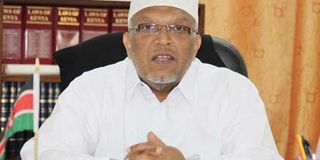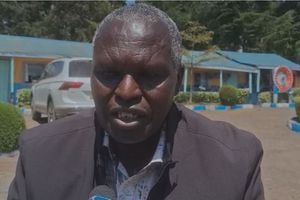Chief Kadhi was right on Eid Ul Adha fete

Chief Kadhi Sheikh Ahmed Muhdhar. PHOTO | FILE | NATION MEDIA GROUP
What you need to know:
- Eid Ul Adha is marked on the 10th day of Dhul Hijja through morning prayers and, thereafter, slaughtering of an animal — preferably a lamb.
What the Chief Kadhi did was to strictly adhere to the teachings — to follow the sighting of the crescent moon in their region.
Even in Kenya, Muslims break their fast according to their location.
Unity in Islam envisioned in Quran 3:103, that Muslims should hold together and not be divided, is not about when they mark Eid.
Debate on when Kenyan Muslims were to mark this year’s Eid Ul Adha dominated the national discourse. Some argued that the Chief Kadhi, Sheikh Ahmed Mohdhar, had erred in advising Muslims to ignore the gazetted date by Interior Cabinet Secretary Fred Matiang’i.
The Chief Kadhi reiterated that he had written to Interior CS Fred Dr Matiang’i informing him that, according to the Islamic jurisprudence, Kenyans had sighted the crescent moon on Sunday, August 12; hence, the first day of Dhul Hijjah was Monday, August 13.
Dhul Hijja is the third month after Ramadhan and, by the Islamic calendar, the last of the year. Nevertheless, the CS declared August 21 a public holiday.
FEAST OF SACRIFICE
Eid Ul Adha (Feast of Sacrifice) is marked on the 10th day of Dhul Hijja through morning prayers and, thereafter, slaughtering of an animal — preferably a lamb — in remembrance of Abraham and his son (Christians believe it was Isaac while Muslims are taught that it was Ismail).
Although it coincides with pilgrims congregating in Medina, Saudi Arabia, this Eid has no relationship with Hajj.
In my opinion, the Chief Kadhi was right. Six great scholars of Hadith of the Prophet Mohamed (Peace Be Upon Him) — Muslim Hadith number 1819, Tirmidhi (H.629), Nasa’i (H.2084), Abu-Dawud (H.1985), Musnad Ahmad (H.2653) and Dar-qutni (H.2234) — all have Kurayb narrating that he was sent by Ibn Abbas in Medina to Mu’awiyah, who was in Sham. While there, they saw the moon for the beginning of Ramadhan.
Kurayb narrates: “Ibn Abbas asked me about the moon. I said: 'We saw the moon the night of Friday.' He asked, 'Did you see it as well?' I said: 'Yes, I saw it too and many others saw it and we all kept fasting and so did Mu’awiyah.'
SAW THE MOON
“Ibn Abbas said: 'But we saw the moon on Saturday night, therefore, we will keep fasting for 30 days according to that, unless we sight the moon on the 29th.' I asked: 'You don’t think the moonsighting of Mu’awiyah and his fasting is enough for you?' Ibn Abbas replied: 'No, this is how the Blessed Prophet taught us.”
During his farewell speech, the Prophet said to Muslims to hold fast onto the Quran and Sunnah (His teachings). What the Chief Kadhi did was to strictly adhere to the teachings — to follow the sighting of the crescent moon in their region.
Logically, the whole world cannot observe certain events on the same day. Even in Kenya, Muslims break their fast according to their location.
CRESCENT MOON
The Prophet said that even in the same region, if due to clouds the crescent moon is not sighted in an area, only those who see it are allowed to observe the day.
Chief Kadhis all over the world advise Muslims on, among other things, sighting of the moon and it has been so in Kenya — with or without the Constitution stating so. What our politicians propose is neither in the Quran nor hadith.
Unity in Islam envisioned in Quran 3:103, that Muslims should hold together and not be divided, is not about when they mark Eid.
Their utterances, therefore, should be disregarded by anyone who cares to understand how Muslims decide on when to fast, end the fast or mark an Islamic event.
Mr Namlola, the News Editor, ‘Taifas’, at Nation Media Group, is an educated fellow on Islamic Jurisprudence. [email protected]





